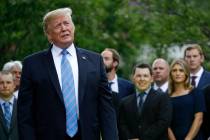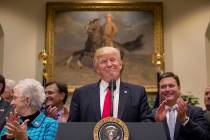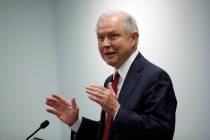A Clinton disdain for the rules
Rule of thumb for a presidential campaign where the two candidates have the highest unfavorable ratings in the history of polling: If you’re the center of attention, you’re losing.
As Election Day approaches, Hillary Clinton cannot shake the spotlight. She is still ahead in the polls, but you know she’s slipping when she shows up at a Florida campaign event with a week to go accompanied by the former Miss Universe, Alicia Machado.
The original plan was for Clinton to pivot in the final week of the campaign from relentless criticism of Donald Trump to making a positive case for herself. Instead, she reached back for a six-week-old charge that played well when it first emerged back then but now feels stale and recycled.
The setback and momentum shift came courtesy of FBI Director James Comey. Clinton’s greatest hurdle had always been the Comey primary, which the Democrats thought she’d won in July when he declined to recommend prosecuting her over classified emails. This engendered an outpouring of Democratic encomiums about Comey’s unimpeachable integrity and Solomonic wisdom.
When it was revealed Oct. 28 that there had been a Comey recount and Clinton lost, Solomon turned into Torquemada. But, of course, Comey had no choice. How could he have sat on a trove of 650,000 newly discovered emails and kept that knowledge suppressed until after the election?
Comey’s announcement brought flooding back — to memory and to the front pages — every unsavory element of the Clinton character: shiftiness, paranoia, cynicism and disdain for playing by the rules. It got worse when FBI employees began leaking stories about possible political pressure from the Department of Justice and about parallel investigations into the Clinton Foundation.
At the same time, Clinton was absorbing a daily dose of WikiLeaks, offering an extremely unappealing tableau of mendacity, deception and the intermingling of public service with private self-enrichment. It was the worst week of her campaign, at the worst time.
And it raises two troubling questions:
— Regarding the FBI, do we really want to elect a president who will likely come into office under criminal investigation by law enforcement? Congressional hearings will be immediate and endless. A constitutional crisis at some point is not out of the question.
— And regarding WikiLeaks, how do we know it will have released the most damning material by Election Day? A hardened KGB operative such as Vladimir Putin might well prefer to hold back whatever is most incriminating until a Clinton presidency. He is surely not above attempted blackmail at an opportune time.
There seems to be a consensus that Putin’s hacking gambit is intended only to disrupt the election rather than to deny Clinton the White House. Why? Putin harbors a deep animus toward Clinton, whom he blames personally for the anti-Putin demonstrations that followed Russia’s rigged 2011 parliamentary elections.
Moreover, Putin would surely prefer to deal with Trump, a man who has adopted the softest line on the Kremlin of any modern U.S. leader.
In a normal election, the FBI and WikiLeaks factors might be disqualifying for a presidential candidate. As final evidence of how bad are our choices in 2016, Trump’s liabilities, especially on foreign policy, outweigh hers.
We are entering a period of unprecedented threat to the international order that has prevailed under American leadership since 1945. After eight years of President Obama’s retreat, the three major revisionist powers — Russia, China and Iran — see their chance to achieve regional dominance and diminish, if not expel, American influence.
At a time of such tectonic instability, even the most experienced head of state requires wisdom and delicacy to maintain equilibrium. Trump has neither. His joining of supreme ignorance to supreme arrogance, combined with a pathological sensitivity to any perceived slight, is an invitation to calamitous miscalculation.
Two generations of Americans have grown up feeling that international stability is as natural as the air we breathe. It’s not. It depends on continual, calibrated tending. It depends on the delicate balancing of alliances and the careful signaling of enemies. It depends on avoiding self-inflicted trade wars and on recognizing the value of allies such as Germany, Japan and South Korea as cornerstones of our own security rather than satrapies who are here to dispatch tribute to their imperial master in Washington.
It took seven decades to build this open, free international order. It could be brought down in a single presidential term. That would be a high price to pay for the catharsis of kicking over a table.
Charles Krauthammer’s email address is letters@charleskrauthammer.com.












